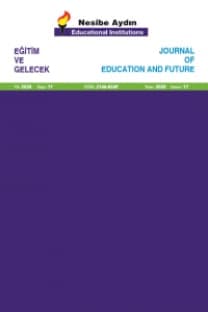Bibliyoterapi Yönteminin Üstün Zekâlı/Yetenekli Öğrencilerin Problem Çözme Becerisine Etkisi
Effect of Bibliotherapeutic Approach on Problem-Solving Skills of Gifted/Talented Students
___
- Bryant, J. & Roberts, S. (1992). Bibliotherapy: an adjunct to audiologic counseling. JARA XXV, 51- 67.
- Bulut, S. (2010). Bibliyoterapi yönteminin okullarda psikolojik danışmanlar ve öğretmenler tarafından kullanılması. [Use of bibliotherapy method in schools by psychological counselors and teachers] Elektronik Sosyal Bilimler Dergisi, [Journal of Electronic Social Sciences] 9(34), 17-31.
- Celkan, G. (2006). Çocuk edebiyatının dil eğitimi ve öğretimi açısından önemi. [The importance of children's literature in terms of language education and teaching] II. Ulusal Çocuk ve Gençlik Edebiyatı Sempozyumu Bildiri Kitabı, [II. National Children and Youth Literature Symposium Proceedings Book] S. 613-620. Ankara Üniversity.
- Clark, B. (2015). Üstün zekalı olarak büyümek. evde ve okulda çocukların potansiyellerini geliştirmek. [Growing up gifted. improve children's potential at home and at school] İstanbul: Nobel Academic Publishing.
- Ersoy, Ö. & Avcı, N. (2004). Özel eğitim [Special education] İstanbul: Ya-pa Publishing.
- Forgan, J, & DeHass, G. (2004). How to infuse social skills training into literacy instruction. Teaching Exceptional Children, 36(6), 24-37.
- Halsted, J. W. (2002). Some of my best friends are books: Guilding gifted readers from preschool to high school. Scottsdale, AZ: Great Potential Press.
- Heath, M. A., Sheen, D., Leavy, D., Young, E. & Money, K. (2005). Biliotherapy: Aresource to facilitate emotional healing and growth. School Psychology, 26(5), 563-580.
- Hebert, T. & Furner, J. (1997). Helping high ability students overcome maths anxietythrough bibliotherapy. Journal of Secondary Gifted Education, 8(4), Sayfa 164-179.
- İlter. B. (2015). Bibliyoterapi tekniğinin üstün yetenekli çocukların mükemmeliyetçiliği düzeylerine etkisi, [The effect of bibliotherapy technique on perfectionism levels of gifted children] (Unpublished Master Thesis), Fatih Sultan Mehmet Foundation University, Istanbul.
- Leana- Taşcılar, M. (2012). Üstün zekâlı ve yetenekli öğrencilerin de bulunduğu sınıflarda bibliyoterapi kullanımı: model önerisi, [Use of bibliotherapy in classes with gifted and talented students: model proposal] Türk Üstün Zekâ ve Eğitim Dergisi, [Turkish Journal of Superior Intelligence and Education] 2(2), 118-136.
- McCulliss, D. (2012). Bibliotherapy: Historical and research perspectives. Journal of Poetry Therapy, 25 (1): 23-38.
- Öner, U. (2007). Bibliyoterapi, [Bibliotherapy] Journal of Arts and Sciences, Sayı 7, Sayfa 133-150
- Pardeck, J. T. (1993). Literature and adoptive children with disabilities. Early Child Development and Care, 91, 33–39.
- Pardeck, J. T. (1995). Bibliotherapy: An innovative approach for helping children. Early Child Development and Care, 1 (1), 83-88.
- Philpot, C. B. (1997). “Interactive story book software: effects on verbal development in kinder garten”. Early Childhood Development and Care, 132, 33-44.
- Sak, U. (2013). Özel eğitime gereksinimi olan öğrenciler ve özel eğitim. [Special education students who require special education] Ankara: Pegem Academy.
- Sezgin, E. (2011). Problem çözme becerisi ölçeğinin geliştirilmesi, [Developing the problem solving skill scale] (Unpublished Master Thesis) Ankara University Institute of Educational Sciences,
- Sümbüloğlu, K. & Sümbüloğlu, V. (2007). Biyoistatistik. [Biostatistics] Ankara: Hatiboğlu Printing and Publishing.
- Uçan, H. (2006). Edebiyat eğitimi, estetik bir hazzın edinimi, okumanın alışkanlığa dönüştürülmesi ve yazınsal kuramlar. [Literature education, acquisition of aesthetic pleasure, transformation of reading into habit and literary theories] MEB Dergisi, [MEB Journal] 169, pp. 25-39.
- Yalçın, A. & Aytaş, G. (2003). Çocuk Edebiyatı. [Children's Literature] Ankara: Akçağ Publications.
- Wolberg, L. R. (1967). “Hypnoanalysis.” The technique of psychotherapy içinde (pp. 578-582). Vol 2. New York: Grune and Stratton.
- ISSN: 2146-8249
- Yayın Aralığı: Yılda 2 Sayı
- Başlangıç: 2012
- Yayıncı: Nesibe Aydın Eğitim Kurumları
Yazma Sınıfının Ters Yüz Edilmesi: Yazmayı Geliştirmek için Dilbilgisi Videolarının Kullanımı
Mary Jane M. ÖZKURKUDİS, Nilay T. BÜMEN
Çevre Okuryazarlığı: Türkiye’deki Peyzaj Mimarlığı Öğrencileri ile İlgili Bir Değerlendirme
Okul Yönetiminde Beklentilerin Gücü: Pygmalion Etkisi
Mukadder BOYDAK ÖZAN, Seda GÜNDÜZALP
Arttırılmış Gerçekliğin Eğitsel Potansiyeli: Öğretim Tasarımcılarının ve Uygulayıcıların Deneyimleri
Rabia M. YILMAZ, Yüksel GÖKTAŞ, Ömer KOÇAK, Sevda KÜÇÜK
Sosyal Destek Algısı ve Akıllı Telefon Bağımlılığı İlişkisinde Etkileşim Kaygısının Aracılık Rolü
Mustafa ALTUN, Khabib AKHMADJONOV
Bibliyoterapi Yönteminin Üstün Zekâlı/Yetenekli Öğrencilerin Problem Çözme Becerisine Etkisi
Yaşam Boyu Öğrenme için Kişilerarası İletişim Eğilimleri: Birinci Sınıf Öğrencileri Örneği
